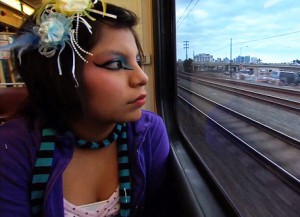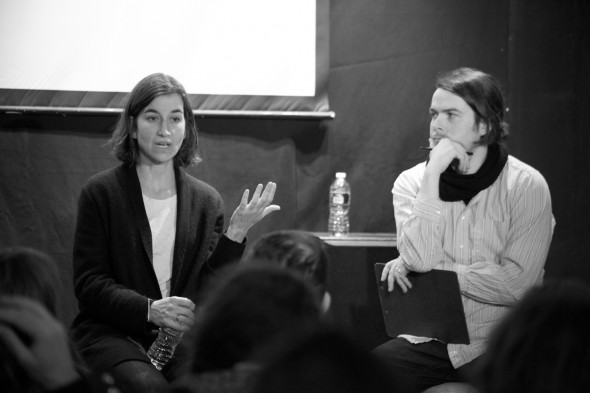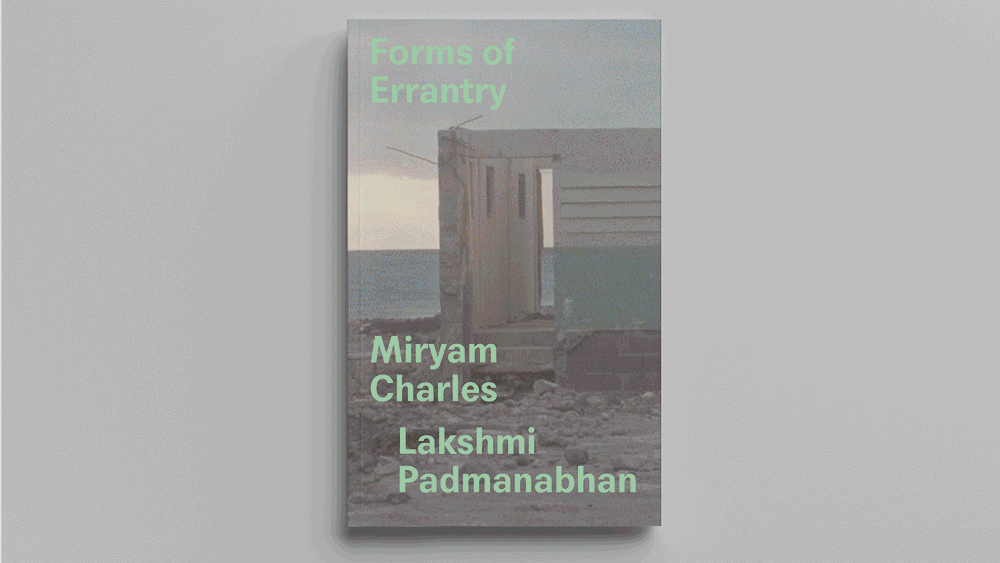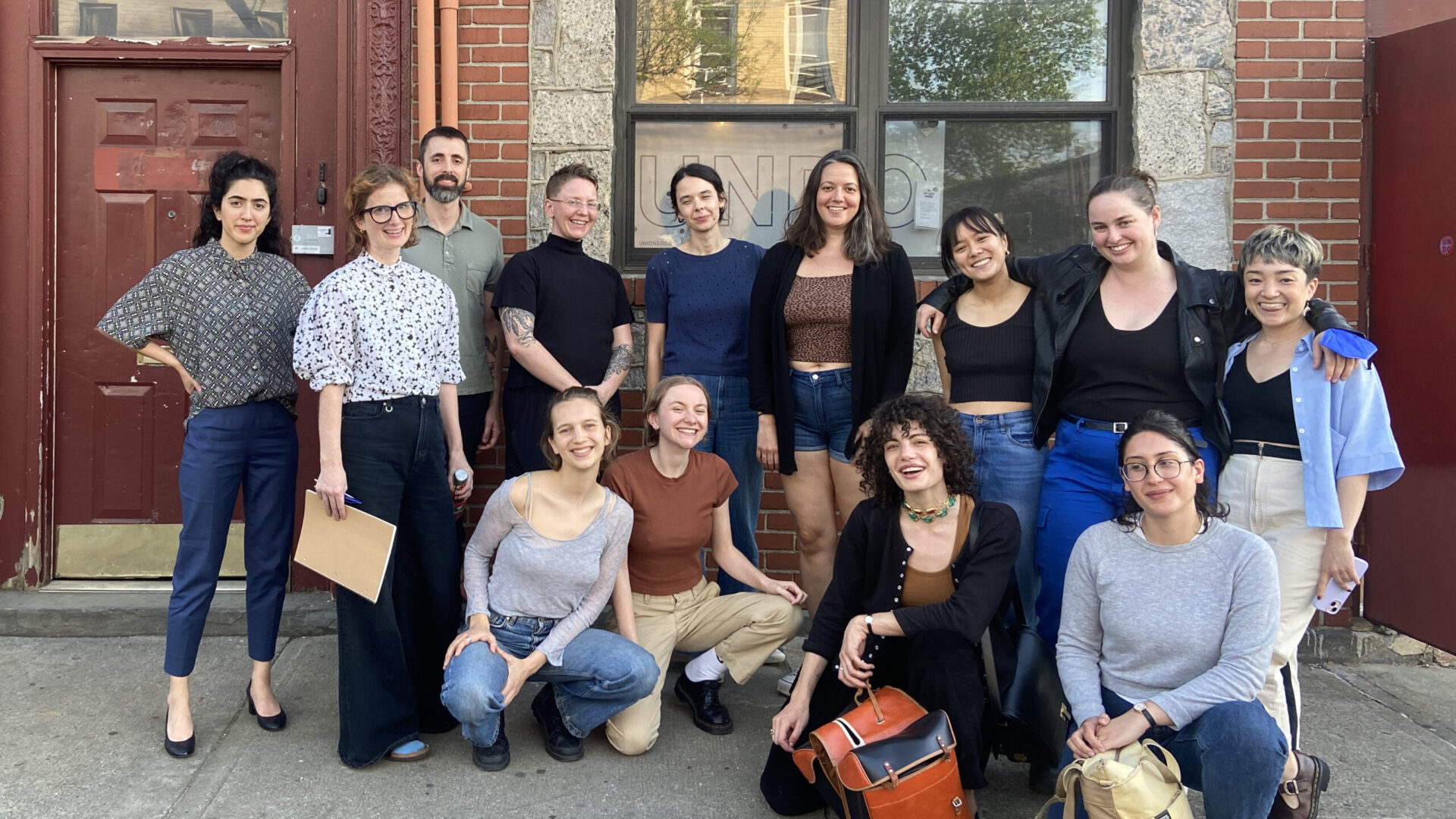Inspiration can sprout from dire circumstances. For Inocente, a homeless teenager in Los Angeles who was constantly on the move with her mother and two brothers, her desire to create art ended up carving a path out of a terrible situation. A documentary about her, Inocente, directed by Sean Fine and Andrea Nix Fine, won the 2013 Academy Award for best Documentary Short. Yael Melamede, one of the film’s producers, attended the screening of Inocente at UnionDocs on February 9th.
Yael Melamede is a filmmaker and co-founder of SALTY Features, an independent production company based in New York City. Additionally, she serves on the Board of Directors at UnionDocs. Melamede’s previous films include Brief Interviews With Hideous Men, written and directed by John Krasinski, based on the book by David Foster Wallace; The Inner Life of Martin Frost, written and directed by Paul Auster; and the Academy Award-nominated My Architect, directed by Nathaniel Kahn. Melamede was an architect before becoming a filmmaker.
Melamede’s next projects include: When I Walk, a documentary by Jason DaSilva and Alice Cook about living with multiple sclerosis; Desert Runners, a film directed by Jennifer Steinman about ordinary people running ultramarathons in the world’s most treacherous deserts; and Slippery Slopes, a film she is directing about dishonesty, based on the work of behavioral economist Dan Ariely.
The post-screening Q&A for Inocente was hosted by Christopher Allen, founder and director of UnionDocs.
Read the edited transcript of the post-screening Q&A below.
Christopher Allen: What’s going on with Inocente now? Are there any updates you can share?
Yael Melamede: As an artist, she’s doing really well. She’s living off of her art. She’s moved into her own apartment. And she’s going to the Oscars on the 24th, so there’s been all of this press: “From homeless to the red carpet.” A whole bunch of us went to D.C. earlier this week and showed the film on Capitol Hill. It was an incredibly eye-opening, eye-numbing experience. Inocente is coming into her own as an advocate. She’s a very shy person, so this was a really generous and brave thing for her to do.
Pills Audience Member #1: How did you meet her?
YM: We wanted to do a film about homeless kids in this country. We went to a lot of organizations, including one in Los Angeles. They said, “Well, we don’t know anybody, but there’s an organization in San Diego called ARTS (A Reason To Survive) and you should contact them.”
The directors contacted ARTS and Matt, who you see in the film, said, “We have this kind of amazing teenager and, no, we can’t put you on the phone with her and, no, you can’t Skype with her. You have to come here and meet her.” So, they did that on the basis of that conversation.
Inocente was 15 years old at the time. We were so taken with her that we thought that the other characters would pale in comparison. We also thought there are a lot of multi-character films out there. So if we focused on her, we could do more about other issues—immigration, arts education. Teen homelessness was very interesting, but one of the things I loved about focusing on arts education is that it’s very positive. Whereas homelessness would be all about saying what problems there are, arts education was saying that if there’s more access to arts education, then good things will happen. There was also the benefit that if we focused on one character, then the film would be less expensive, but that wasn’t entirely the driving force.
We were so taken with her that we thought that the other characters would pale in comparison. We also thought there are a lot of multi-character films out there. So if we focused on her, we could do more about other issues—immigration, arts education. Teen homelessness was very interesting, but one of the things I loved about focusing on arts education is that it’s very positive. Whereas homelessness would be all about saying what problems there are, arts education was saying that if there’s more access to arts education, then good things will happen. There was also the benefit that if we focused on one character, then the film would be less expensive, but that wasn’t entirely the driving force.
Audience Member #2: What happened to her mother and brothers?
YM: Inocente went to Toussaint [a group home for homeless youth in San Diego]. They had a lot of rules and she doesn’t do so well with a lot of rules. She also talks about how there were some mean girls who stabbed some of her paintings. So she left, and she went back and forth. Then, as soon as she was able to, she moved into her own place. She and her mother are on much better terms. Her brothers are all with her mom, and they are getting legal status.
Audience Member #3: Were you concerned with the scene with her mother and the two people talking in the room? And having the camera in the room? The mother looked like she was being ambushed.
YM: That was a scene we cut in a lot of different ways… The truth is that Inocente’s mother had gotten used to the camera as well… I think you see that it’s both difficult for her, difficult for everybody in the room. And the camera definitely has an impact, but I also think what happened there was very true and can be interpreted in many different ways and they would all be true. There isn’t one truth in the room. But I strongly believe that no harm was done as a result of the camera being there.
Audience Member #4: I was wondering if, for Inocente, seeing her mother being so honest has helped repair things between them.
YM: There was the part where her mom says, “I wish I could start giving her the hugs
I stopped giving her.”  We shot that long before the film was finished. We had discussions about whether we should show it to Inocente before or not and we thought that wasn’t really fair. Inocente has seen the film many times and has been at many screenings we’ve given. The wonderful thing is that the film has changed her life. She’s traveled the country, which she never had before. She’s talked about the film. I think in filmmaking, we want to believe in fairytales. We want to believe that this film has changed her life and she will forever be happy. That’s also not the truth. The film has improved lots of things, but her life is still complicated. Her relationship with her mother is still complicated. Buy
We shot that long before the film was finished. We had discussions about whether we should show it to Inocente before or not and we thought that wasn’t really fair. Inocente has seen the film many times and has been at many screenings we’ve given. The wonderful thing is that the film has changed her life. She’s traveled the country, which she never had before. She’s talked about the film. I think in filmmaking, we want to believe in fairytales. We want to believe that this film has changed her life and she will forever be happy. That’s also not the truth. The film has improved lots of things, but her life is still complicated. Her relationship with her mother is still complicated. Buy
Audience Member #5: I was wondering about the choices and decisions regarding including her legal status and immigration in the overall story.
YM: As we got towards the end of the film, it was clear if she was going to be okay. Right when we started the editing process, we got a grant that allowed us to start thinking about our outreach strategy very early… We had to think, what do we really want to advocate? How do we want to use this film? I think it’s a great model for outreach… we had the time and space to do that. We brought a lot of not-for-profit organizations together. We said that immigration is one of the issues that is really important to us, but it’s not touched on as with as much detail as homelessness or arts education, and in a way, I think it’s fine because she’s really a poster child for the DREAM Act. Through what she does, she’s exactly why the DREAM Act should pass…






